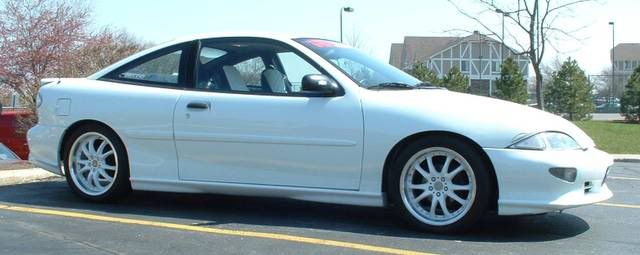I have a 1997 Cavalier Z24. I have noticed a contradiction between the recommended oil viscosity between the service manual book and the owner's manual. The service manual recommends 10w 30 when temperatures are above 60 degrees F and 5w 30 when below 60F. The owner's manual recommends 5w 30 year round but you can use 10w 30. What is the best viscosity oil protection? I have been using 10w 30 in the summer and 5w 30 in the winter months. After noticing the oil recommendations in the owner's manual (preference of 5w 30 year round) I'm wondering if I have been correct. What oil viscosity have you all been using in the 2.4 twin cam engine?
listen to the service manual, use thinner oil in the winter, thicker oil in the summer.
My local GM dealer uses 10w30 year-round in everything. Corvettes might be a different story, of course.
'03 LS SPORT COUPE 5 SPEED black with teal/silver pinstripe

5w30 is for our engines
You can use 10w30 aswell only difference is when the engine is cold the oil is as thick as a 10 grade (thicker) when engine is in normal operating temps them the oil viscosity will be a 30 grade.
With either you are not harming the engine and it will work well. 10w30 there is a less chance of oil burn and a little better protection initially, but 5w30 will give you a little better MPG and performance.
I personally am going on 0w40 Mobil 1.
 >>>For Sale? Clicky!<<<
-----The orginal Mr.Goodwrench on the JBO since 11/99-----
>>>For Sale? Clicky!<<<
-----The orginal Mr.Goodwrench on the JBO since 11/99-----


Mr.Goodwrench-G.T. wrote:I personally am going on 0w40 Mobil 1. 
That's what I use in both my Toyota truck and GTO... Super thin on startup to get to those hard-to-reach areas, and thicker once it gets to operating temperature for better protection.
Only problem is the price.... $30 for the Goat and $20 for the Toyota... plus a filter for each

Rob
 Sold 2/2/05
Sold 2/2/05
Do not want an engine problem because of using the incorrect weight of oil. Why would the service manual and the owners manual have different oil recommendations?
Put what belongs, which means what it says on the filler cap, and change it on a regular basis, and you'll be OK.
Syn oil is a waste of cash IMO on our cars.
Some need it, or it's a good idea, but we are talking cars that we will prolly never be able to afford.
I don't know why the service manual only recommends 10w30.
Mr. Goodwrench explained it quite well, neither oil is going to damage your engine.
They can get away with 0w40 because its a synthetic oil, which has much superior lubricating qualities.
I am using 10w30 conventional year-round in my Ecotec, because thats what my dealer uses. I know its not the same engine you have, but its a similar design, 16 valve DOHC.
On the 3.4 liter V6 in my wife's '99 Chevy Venture minivan, I used to use nothing but 5w30 conventional. Now that I'm approaching 100,000 miles in this vehicle, I've started using 10w30 conventional in the summer, 5w30 in the winter.
From my research, 10w30 theoretically holds up better in heat, because less polymers are used to bring the oil from a 10 weight to a 30 weight. More polymers are needed to bring a 5 weight to a 30 weight, and supposedly the more polymers used in a conventional oil, the less stable they are.
Someone correct me if I have that info screwed up.
Bottom line, 5w30 or 10w30 is fine. Only with synthetics, would I consider other weights.
'03 LS SPORT COUPE 5 SPEED black with teal/silver pinstripe

i use 10w-30 royale purple fairly cheap for synthetic and seems to work fine in my2000 2.4l sunfiregt in winter or summer.
i use castrol syntec 10w30 plus lucas oil treatment.
i use 15w-30 synthetic mobile 1
DRIVE HARD OR DONT DRIVE AT ALL!!!

There is a reason you oil cap is printed with the recommended viscosity. Because less people will put 5w-50 in an engine that is suppose to use 5w-30.
and mrgwgt: the smaller the # the thinner the oil. So thin on startup, thicker when warm.
 My Car
My Car
I use 5w 30 synthetic as well, its the extended life product
JBP Built 2.4
250HP
230FT
Dont race
But dont push it
what kind of oil is good for racing that reduces the most friction
DRIVE HARD OR DONT DRIVE AT ALL!!!

Mr.Goodwrench-G.T. wrote:Sunfires rule! (Tom) wrote:
and mrgwgt: the smaller the # the thinner the oil. So thin on startup, thicker when warm.
I know that, the thicker I mentioned was a comparison of 5w30 vs 10w30. Re-read the first sentence. 
Alright. If you read just that sentence that what it looks like you are saying. my bad
 My Car
My Car
CAVI.DEMON wrote:what kind of oil is good for racing that reduces the most friction
lucas, redline or royal purple 30 to 40wt synthetics, in my opinion.
Yes, what he said^^

If you are going to be using for race purpose (ONLY).
Look at;
Royal Purple "Racing Oil"
or
Mobil-1 15w-50 "Racing Formula"
That high viscosity level will give you the protection and less chance of oil burn for those high stress, hot and high reving racing which it can be brutal to the internals of any engine.
>>>For Sale? Clicky!<<<
-----The orginal Mr.Goodwrench on the JBO since 11/99-----


I may be crazy but since im out in the hot summer sun and oil just doesnt hold up for me. I switched to using a 20-50 Quaker State oil that seems to help alot when its hot out. Plus its helped with my lifter thats having issues ticking alot. I think it helps me out here in the Mojave desert but since im moving im going back to a 10-40 which is what i normally use. I jsut used the 20-50 since it has gotten hot outside and figured it might help out alot.
Well, lets talk economics, $1.49 a quart for regular oil, which is fine for a non race application, or $4.99 a quart for synthetic, add the cost of a standard filter which is roughly $6 for the ECO, and see the total, you are spending waaay more for nothing but a piece of mind.
You might as well add premium fuel to a car that does not require it at the same time, just so you have a complete waste of money, after all you work for it, right?
You get no more power, you get no more engine life, you just spend more of your hard earned money for NOTHING!

03ecols 5 spd wrote:Well, lets talk economics, $1.49 a quart for regular oil, which is fine for a non race application, or $4.99 a quart for synthetic, add the cost of a standard filter which is roughly $6 for the ECO, and see the total, you are spending waaay more for nothing but a piece of mind.
You might as well add premium fuel to a car that does not require it at the same time, just so you have a complete waste of money, after all you work for it, right?
You get no more power, you get no more engine life, you just spend more of your hard earned money for NOTHING!
you evidently dont race, or you follow manual to the letter.
synthetics do lubricate better and longer than conventionals, to prove it lets go on a 500 mile road trip at 70 mph together, i wonder whose engine will seize first?.
93 octane gas yeah its expensive but there are perks, for example my engine does not knock or ping under any circumstance, cold or hot, underload or empty, even tho she has a 9.5:1 CR.
my car/engine has almost 200k miles on her with nary a prob. plan to go another 300k.
do that in you 87 octane/conventional oil filled "got more home&garden mags than tools in my trunk". the manual tells you to use 5w30conv.-87octane BECAUSE they want or expect you to trade your car in they dont expect you to actually want to work on it.
i'll bet that your new car has the fuel filter attached to the sending unit in the tank?
its not even a filter, its a couple of chainsaw filter screens 150 micron capacity.
it clogs quick and you have to get it serviced to change the filter.
screw that!!!!
I'm not denying the superiority of synthetic oil, but...
Why would an engine seize after 500 miles at 70 mph on conventional oil? Am I missing something here?
'03 LS SPORT COUPE 5 SPEED black with teal/silver pinstripe

it was just a metaphor i dont think it would, probably more like 2000 miles @100mph flat out.
synthetics just have a superior lube duration compared to conventionals,
side by side i will out last him.








 My Car
My Car


 My Car
My Car

